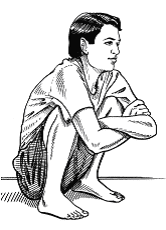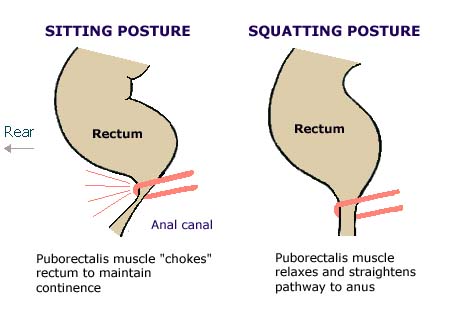Stressor - any agent that causes stress to an organism
Types:
Physical Stressors
Food-related, temperature, sleep, light, radiation, posture, weights and constrictors (such as clothing, sunglasses, jewellery), bad air quality, stressful habits (such as eye straining), and all other environmental stressors.
Psychological Stressors
Pain, discomfort, worry, insecurity, fear, boredom, low self esteem, and all other negative mental emotions, attitudes, and constructs.
Stressors are all around us, and to an extent, they're necessary to keep our bodies fit and healthy. Everything, including gravity, exhibits stress on us, and stress is with us throughout our entire lives. Even without gravity, our bodies produce free radicals and slowly degenerate. The goal is simply to minimise stressors where possible.
There are many significant hidden stressors in our lives, that most people don't know about. I would like to reveal some of the major players, and propose some possible solutions.
The first one, of course, is what we eat, as it's perhaps the most significant stressor. Obviously the Wai diet is well equipped for this problem, so I don't need to add much, except that one should be entirely watchful and aware of ones unique bodily reaction to all foods, even foods recognised as safe by Wai Diet standards.
For example, recently I've been eating many bananas (12+) a day, and thought I was safe. I experienced fatigue and digestive problems, and later found that I wasn't waiting long enough for the bananas to be easy on my body. I now wait until they are heavily spotted brown, all over, before consuming, and have to keep many bananas in my house at all times so as I'm not forced to eat yellow or even greenish ones.
Since eating only very ripe bananas, my digestion and energy levels have become much more stabilised.
The next major physical stressor I've become aware of, is the method of sleeping.
Sleeping on a traditional flat-bed mattress has proven to be harmful to my back. Seeking a better solution, I switched to a very long and wide indoor hammock. The best type of hammock is a bridge hammock, as it allows you to lay 'flat' and sag due to gravity, supporting your body in the best posture, but they don't make these for people as tall as me, yet. (I'm 6'8" tall, the tallest that fits in the current bridge hammocks is 6'3"). Still, I bought a hammock that I can lay 'sideways' in the very middle of it, so as not to be curved like a banana while sleeping. It's also important to sleep on my back, with a very, very thin pillow under my neck and a very thin pillow under my knees. This is to support these high-arch areas that even a hammock can't do, but not to over support them with the conventional mistake of fluffy pillows.
The next biggest hidden physical stressor is how westerners breathe. Many breathe predominately with their mouths, even when not exercising. While fine for getting in extra oxygen, the most efficient and least stressful way to breathe is through the nostrils, in a manner that your lower chest area expands and collapses more predominately than your upper chest area (like what happens when mouth breathing).
The reason this one is so important, is that we constantly breathe, so over time this shallow mouth breathing can cause a lot of hidden stress.
Next is how we defecate, also known as how we go to the bathroom.
I still haven't discovered how best for males/females to urinate, but for defecation the best posture is squatting, and recently I've discovered that half-squatting just isn't good enough. Using stools, or other makeshift devices to turn a conventional sitting toilet to a squatting platform don't do the job. The most effective solution I've found, is to use a high quality stainless steel bowl, and defecate in that inside a bathtub, using something for support while you train your muscles to be able to squat. Most people who are not into yoga in western society will have a very difficult time achieving this natural position without holding onto something, because we've been sitting for so long. If there's nothing to hold onto in your bathtub, you can throw a belt over a sturdy towel rack and hold onto that.
Here's the proper posture:

As you can see, once you get good at this position, you'll need a very shallow bowl.
Using a stool to raise the feet on a conventional toilet is not anywhere close to the same thing.
Ideally, ALL weight should be on your feet, and your feet should be flat. The thighs must be pressing into your abdomen, as this helps facilitate the defecation process.
In the squatting position, the right thigh – pressing on the right side of the abdomen – squeezes the pouch-like cecum and force liquid waste upwards into the ascending colon and away from the appendix.
Hence, in the squatting position, the ileocecal valve is sealed securely, and both the appendix and small intestine are kept clean.

I can't emphasise enough how much stress is alleviated by defecating properly.The colon also a kink or bend where the sigmoid colon joins to the rectum.
In the squatting position, the left thigh – pressing on the left side of the abdomen – supports and lifts up the sigmoid colon. This raising of the sigmoid colon opens up the kink to allow waste to flow easily into
My guess is that for urination, the best position is the natural squatting position, and just urinating freely in a bathtub, but I could be wrong. I do know that the sitting or standing position for male urination is harmful, as it can put more downward force on the penis to urinate than is natural.
I will continue editing this post and add more later, for reference, here are some more common hidden stressors affecting us everyday.
Bad air quality (indoor, due to bad circulation and cleaning chemicals, dust, etc, and outdoor, mainly due to car pollution near busy streets or cities).
Too much light during sleeping, or too much light (such as from computer) at night time prior to sleeping, disrupting the bodies natural sleeping mechanisms.
Eating too much at one time, heavy meals, instead of light and frequent meals. Also, eating too much or eating too much 'dry' foods, instead of foods high in water.
Eye strain on computers, incorrect eye habits, leading to myopia and other eye problems. (Myopia is curable, if you can manage without glasses, even for a minute, for years on end, but is practically impossible to cure naturally because most people depend on them. However, for children, it is 99% of the time preventable just by refusing to sign up for the first pair of glasses/contacts, and stopping them from watching television, using computers, or texting on phones, and limiting their reading-time for books, encouraging them to go outside and play, giving their eyes a healthy far/near dynamic environment.)
Shoes and walking - most shoes are disasters to our walking and standing postures, causing more stress than is necessary. I will share my research for the best footwear later, but for now, you should know that whenever possible, barefoot is best. Always walk around barefoot if you're allowed and able to, such as in your home, no socks.
Clothing - Most clothing is either too heavy or too constricting. I'll add more later.
Jewellery - Adds excess weight, this includes sunglasses and eyeglasses, always opt for the most comfortable, lightest pair. Jewelry can also cause problems in the wrong places, leading to infections, etc.
Cleaning ears - Most people clean their ears with q-tips in the ear canal, they should never do this as it can cause infections and ear pain.
Sitting postures - Most people sit in chairs - at the office or in sofas at home, these are almost always stressful to the body, even if you have become accustomed to them and can't notice it. The best solutions I've found are 'skychairs' or hammocks you can sit in and 'swing in', dynamically shifting the compression load on the bones of the body constantly, swinging dangling legs helps tremenously, and also the fact that the bottom of 'ceiling' hung chairs is conforming to your body. The skychair has the benefit of proper upright back-support, at the optimal angle/slant.

[New] Hot water baths and showers - Hot water is damaging to skin, especially over time when you take daily hot showers. Body lotions try to compensate for the damage, but these too are harmful, clogging the skin. Always try to take showers with the least amount of heat you can tolerate. Be aware, icy cold showers also create stress, it's best to have 'cool' showers where the temperature is slightly below comfortable - then be sure to keep the showers as short as possible.
The same goes for soap - I don't use soap and I smell fine, I've asked people to smell me and they agree. The better your diet, the less you'll need soap any way. Soap is okay for hands, when very greasy or dirty, or if you get really dirty from playing in the mud, etc, but it is not ideal for regular use. Shampoos are also largely unnecessary, especially in the amounts people use them today. Many peoples diets are so unbalanced, and they use shampoo so regularly, that hair oil production will increase to compensate, making them more dependent on shampoo. I still use small amounts of shampoo, for hairy areas, but I'm reducing the amount to slowly allow my body to readjust to normal oil production. Always buy shampoos that don't have fragrances, and have the least amount of chemicals listed on the back of the bottle, as a rule of thumb.
Also, never use anti-antiperspirants, most of them contain toxins, and even if they don't, they are blocking your body from sweating - not ideal. You can use very gentle deodorants instead, but try to reduce usage and fix your diet until you no longer depend on these as well.
Psychological Stressors
I'll be adding more to the physical stressors section, but there is one very big psychological stressor that deserves realisation.
World views - Our world views are how we interpret and understand, to a large degree, what reality is to us.
While you are always free to have your own world view, it's apparent that some are more logical and stress free than others. While it would be nice to be able to believe whatever we wish - this is hardly the case, we require some form of evidence, even if not scientific evidence, or logic, reasoning, etc, to validate our world view, no matter how crazy or rational it may be. This is why a world view that rests on logic and science is one of the most stable world views, and it also happens to be a very peaceful one. I'm not going to debate if other world views make sense or not, I'm merely stating that world views can be a source of stress or comfort. Even in a completely idealistic world view, such as that we are eternal beings that never die and are almighty in power, etc, cause harm in individuals because it conflicts with the reality they see before their eyes - causing confusion and uncertainty.
My world view is deterministic, which means, "that every type of event, including human cognition (behaviour, decision, and action) is causally determined by previous events."
You will have to decide for yourself if determinism (which again means that 'everything has a cause') makes sense. Here's some of the characteristics of being a determinist.
If 'everything' is neutral (not good or evil, because no one has free will), you are left to focus on the positive rather than the negative, whatever 'positive' and 'negative' might mean to you. This is because all humans (and all living things) are intrinsically selfish (this is not evil, as selfishness comes in many forms, including charity).
Here's a partial list off the top of my head of concepts that are realised to be false by a deterministic viewpoint:
good/evil (all false forms of circumstances, which can be beneficial or not depending on the individuals circumstances)
prolonged need for regret (our emotions are somewhat uncontrollable, but long-held painful emotions are a result of a confused view of reality)
prolonged need for guilt
prolonged need for sorrow
beliefs in myths
beliefs in gods
belief in any faith
praise/insults/looking down on people/higher status/lower status/etc
chaotic view of nature, luck, chance, etc
belief in free will
belief in the power to truly make decisions (you can make decisions - but it only seems like you decided which ones you made, you are really on a fixed 'roller-coaster', one you will most likely never be able to foresee, therefore making it enjoyable)
You realise yourself as a selfish hedonist (pleasure seeker), hopefully enlightened enough to realise that the healthy cooperation and understanding of all mankind and life on this planet and balance with nature will benefit you in the long run in ways you simply can't get from violence, greed, hoarding, anger, stagnation, faithful beliefs, etc. (some benefit examples would be - advanced technology for life extension, having robots do all the slave work, and getting to focus on creative jobs or no job at all - just discovery and leisure, no violence, safer world, etc)
Being deterministically minded does not mean that killing people is justifiable, it just means that killers are a non-guilty threat to society, who must be rehabilitated - hopefully in the future by helping them, understanding them, etc, rather than putting them in torturous and ineffective prisons.
Being deterministically minded also does not mean that life has no point, even though it's true that we have no real choices, free will, or truly original creative powers (they're just very powerful illusions). Still, this does not in any way suggest there is no point to life, every person must find their own reason to live, most people (99.9%) will realise that pleasure is the point once they are deterministic, in the nearly infinite ways pleasure comes in. Even selflessly helping others, or breaking your back doing hard work, is pleasure to some people through stroking their ego or self image - this does not diminish them; we are equals. Ego fulfilment and many other things, like scientific discovery, can be pleasurable, not just sex, fast food, beer, etc. Many people, like me, can't get much pleasure from those things, we desire things which are not 'foresee-ably boring', just like kids today aren't satisfied playing with sticks, and ancient children were, we progress from primitive pleasures to more sophisticated and challenging pleasures all the time.
It's my perception that getting people to realise their selfish, hedonistic nature while simultaneously awakening them to the reality that they will benefit the most through cooperation and productivity rather than separation and exploitation is the most viable and powerful catalyst for changing the world for the better - for all of our sakes, because it relies on a realistically scientific, productive, and peaceful world view. This is the most fundamental way I can think of to combat stress at the source, the source that creates most of it - instead of just band-aid it in our harsh environment.
